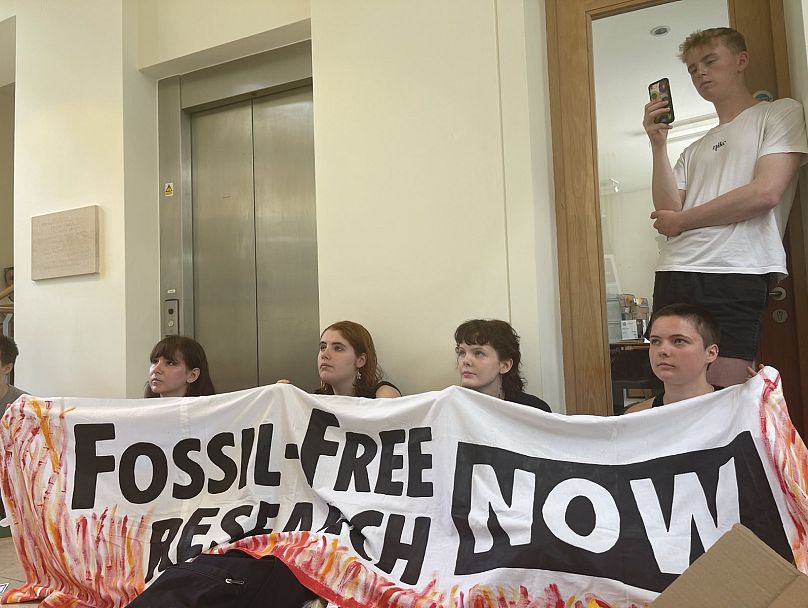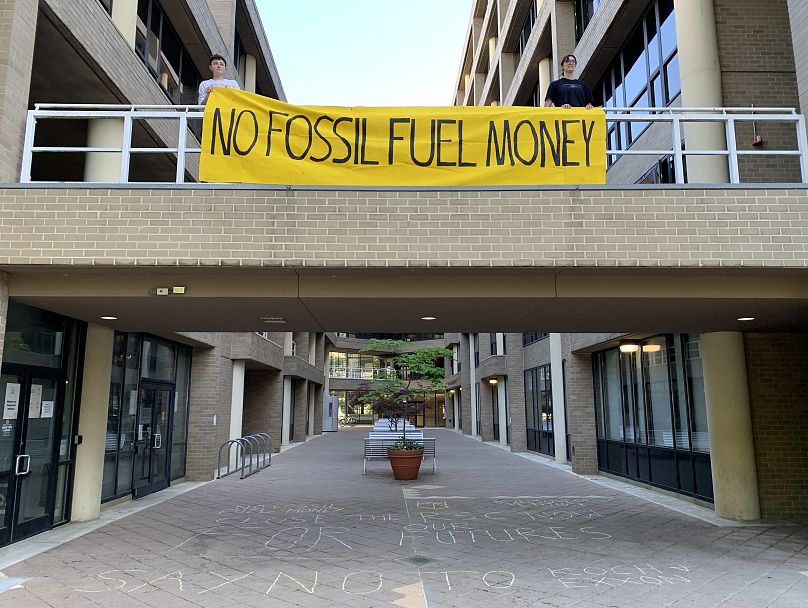Campaigners have welcomed the plan, but say universities must reject fossil fuel funding altogether to stop greenwashing firms.
Cambridge is tipped to become the first UK university to remove an oil company’s name from one of its buildings, following years of campaigning by students.
The BP institute, established 22 years ago through a £22 million (€26 million) donation from the British oil and gas giant, could soon be rebranded. Vice Chancellor Stephen Toope reportedly told academics that the university will choose a name which better reflects its values.
The research centre has been a focal point of activism recently. Earlier this month, a new group called This Is Not a Drill smashed its glass doors in protest at continued funding from BP.
In May, more than 40 students and academics occupied the site for 63 minutes; one for each year since scientists first alerted oil companies to the climate threat posed by their business model.
That action was organised by Fossil Free Research, an international campaign to cut university ties with the fossil fuel industry. It now says it is “thrilled to see the University of Cambridge finally renaming its BP Institute in the wake of powerful and sustained activism from students, community leaders and academics.” The statement celebrates a “momentous victory” for the global movement.
However, the campaigners add, “To truly divorce themselves from the massive reputational and material support that their research lends to the fossil fuel industry’s deadly business model, universities must officially ban all research partnerships with and reject funding from this industry.”
Nothing is set in stone yet. A university spokesperson says “It is a democratic institution and there are always discussions about a very broad range of issues including the names of its many buildings and institutes. No formal decision has been made to rename the BP Institute.
“The University decided in 2020 to accept donations from energy companies only if they aligned with our aims of working towards a zero carbon future.”
Does Cambridge University accept funding from BP and Shell?
Research at the BP Institute focuses on developing a range of energy sources to help in the transition, the spokesperson adds. These include battery technology, geothermal power, and carbon storage.
Since October 2020 - when the university committed to divest from fossil fuels by 2030 - Cambridge has subjected all new funding to what it calls ‘climate specific due diligence and scrutiny’.
What this means in practice is that energy companies can still fund research, provided it helps the world move to renewable or decarbonised energy. As recently as August 2018, the university accepted up to £50k (€59k) from BP that had ‘potential fossil fuel applications’. But since November 2020 all research is furthering ‘green technologies’.
In April 2022, for example, it took up to £2.4m (€2.8m) from Shell for research which aims to advance synthetic aviation fuel.
But campaigners argue that it's unethical for universities to be accepting money from fossil fuel firms whatever the use, thereby “greenwashing” their reputations as they continue to extract.
“Make no mistake, the renaming of the BP Institute is a deeply cynical PR move intended to shield the University from public criticism - even as it continues to accept millions from the fossil fuel industry's blood-stained coffers,” claims outgoing undergraduate president of Cambridge Student’s Union Zak Coleman.
“It is years of high-profile student and community campaigning - not any genuine intention to stop collaborating with the fossil fuel industry - that has embarrassed the university into this decision. Until Cambridge ends all partnerships with BP, Shell, Exxon, Schlumberger and more, its mass greenwashing of the industry destroying habitable life on Earth goes on.”
What other universities have buildings named after fossil fuel companies?
Imperial College London, Cambridge and Oxford universities have received the most funding from major oil companies since 2017, according to an openDemocracy investigation last year.
Cambridge’s BP Institute is far from being the only one to carry the controversial name. The University of Manchester has a BP International Centre for Advanced Materials, Surrey University has its BP Centre for Petroleum and Surface Chemistry, while students at Imperial College London can pursue research at the Shell University Technology Centre for Fuels and Lubricants.
BP told the Sunday Times yesterday that if the university were considering changing the name “to be more explicit about the research it undertakes”, the company would be fully supportive.
A ‘Just Transition Institute’ or ‘Climate Emergency Centre’ are suggestions from Fossil Free Research. But the campaign is urging universities to do more than just rename their buildings.
Its open letter calling for an end to sponsorship partnerships with polluting companies has been signed by more than 740 academics, including IPCC authors, Nobel Prize winning scientists, the former President of Ireland and the former Archbishop of Canterbury.
Other European universities well represented on the letter are the University of Lausanne in Switzerland, France’s University of Notre Dame and Collège de France, Utrecht University in the Netherlands and Trinity College Dublin in Ireland.






